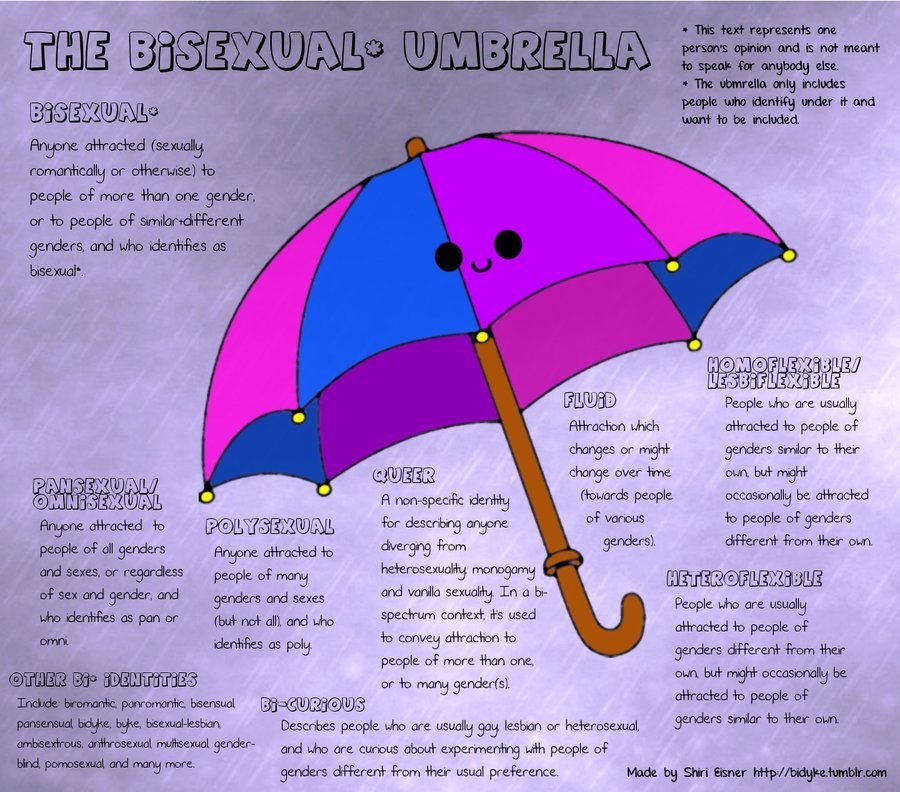The bisexual umbrella (art by Shiri Eisner):
Bisexual, Bi, BI+
A person who has the capacity to form enduring physical, romantic, and/ or emotional attractions to those of the same gender or to those of another gender. People may experience this attraction in differing ways and degrees over their lifetime. Bisexual people need not have had specific sexual experiences to be bisexual; in fact, they need not have had any sexual experience at all to identify as bisexual. Do not use a hyphen in the word "bisexual," and only capitalize bisexual when used at the beginning of a sentence.
We use the term “bi” “bisexual” and “bi+” to mean anyone who is attracted romantically and/or sexually to more than one gender, otherwise called “non-monosexual” or “middle” identities.
Pansexual
Some people who have the capacity to be attracted to people of any gender may consider themselves part of the bi+ community and/or choose other words to describe their sexual orientation, or identity labels like
pansexual, polysexual, omnisexual, ambisexual, fluid, queer, and more. The phrase "hearts not parts" is often used in conjunction with pansexuality, as gender and sex are not determining factors in their romantic or sexual attraction to others.
Pansexual
Some people who have the capacity to be attracted to people of any gender may consider themselves part of the bi+ community and/or choose other words to describe their sexual orientation, or identity labels like
pansexual, polysexual, omnisexual, ambisexual, fluid, queer, and more. The phrase "hearts not parts" is often used in conjunction with pansexuality, as gender and sex are not determining factors in their romantic or sexual attraction to others.
Queer
An adjective used by some people, particularly younger people, whose sexual orientation is not exclusively heterosexual (e.g. queer person, queer woman). Typically, for those who identify as queer, the terms lesbian, gay, and bisexual are perceived to be too limiting and/or fraught with cultural connotations they feel don't apply to them. Some people may use queer, or more commonly genderqueer, to describe their gender identity and/or gender expression (see non-binary and/or genderqueer below). Once considered a pejorative term, queer has been reclaimed by some LGBT people to describe themselves; however, it is not a universally accepted term even within the LGBT community. When Q is seen at the end of LGBT, it typically means queer and, less often, questioning.
Biphobia
Fear of bisexuals, often based on stereotypes, including inaccurate associations with infidelity, promiscuity, and transmission of sexually transmitted infections. Intolerance, bias, or prejudice is usually a more accurate description of antipathy toward bisexual people.
"The Williams Institute found that more than half of all non-heterosexual people in the United States identify as bisexual. Despite making up the majority of people who aren't straight, a 2013 Pew Research Center report showed only 28% of bisexuals said most or all of the important people in their lives knew about their sexual orientation, compared to 71% of lesbians and 77% of gay men. Among bisexual men, only 12% said they were out to that degree. At work, only 11% of bisexual people polled by Pew said most of their closest coworkers knew about their sexual orientation, compared to 48% of gay men and 50% of lesbians." - adapted from the GLAAD Media Reference Guide |
Reports & documents |
|
Words Still Matter
How the Marriage Equality Movement is Leaving Bisexuals Out
by BiPOL, a bisexual feminist political action group founded by Lani Ka'ahumanu in 1983.
by BiPOL, a bisexual feminist political action group founded by Lani Ka'ahumanu in 1983.
Bisexual Invisibility
Impacts and Recommendations
The San Francisco Human Rights Commission is grateful to everyone who made this report possible, including former LGBT Advisory Committee (LGBTAC) members Lindasusan Ulrich, Martin Rawlings-Fein and Greg Shaw.
The San Francisco Human Rights Commission is grateful to everyone who made this report possible, including former LGBT Advisory Committee (LGBTAC) members Lindasusan Ulrich, Martin Rawlings-Fein and Greg Shaw.

